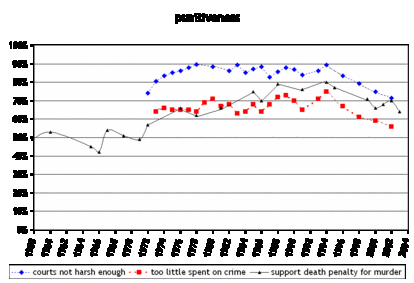if you are my age or younger and live in the united states, serious street crime has now fallen to the lowest levels recorded in your lifetime. according to the just-released
2004 fbi uniform crime reports, the murder rate is at a forty-year low and the overall violent crime rate is the lowest in thirty years. the ucr numbers are based on crimes known to the police, but they are really the most reliable and valid data source for homicide. ucr rates for rape, robbery, aggravated assault, burglary, auto theft and larceny-theft were also down again this year, as were rates of property crimes such as burglary, larceny-theft, and shoplifting. for offenses other than homicide, these numbers should be considered alongside trend data in victimization and self-reported offending. in triangulating these sources, however, one generally gets an encouraging impression. the
local picture is murkier, with serious crime trending upward in several important categories. nevertheless, here too the trend is decent if not encouraging -- particularly since the "murderapolis" days of 1995-1996.
so do you feel safer than you did 5 or 10 or 20 years ago? if not, why not? because 16,000 u.s. murders is still way too many murders? or, has the street crime effect on safety diminished relative to other concerns for you? do you think support for harsh anti-crime measures will diminish if the downward trend continues, or will punitiveness be cited as the reason for diminishing crime rates?
 from the des moines register and talkleft.com: a district court in muscatine has upheld iowa governor tom vilsack's executive order restoring voting rights to all former felons in that state. as i wrote in august, the order raises some interesting legal questions. shelly schaefer and i are presenting a paper framed around some of them in a department workshop november 29:
from the des moines register and talkleft.com: a district court in muscatine has upheld iowa governor tom vilsack's executive order restoring voting rights to all former felons in that state. as i wrote in august, the order raises some interesting legal questions. shelly schaefer and i are presenting a paper framed around some of them in a department workshop november 29:




